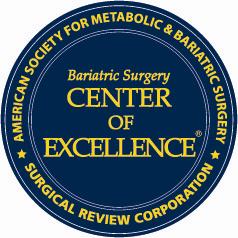what is a bariatric center of excellence?

The American Society for Metabolic and Bariatric Surgery sets forth recommendations, and guidelines for Bariatric Surgery Centers of Excellence, even so, pre-surgical and post-surgical guidelines vary from surgeon to surgeon and by the type of bariatric procedure you select. It is important to follow the guidelines you are given by your surgeon.
Finding a surgeon and a hospital that has been designated as a center of excellence, or more specifically as an American Society for Metabolic and Bariatric Surgery (ASMBS), Bariatric Surgery Center of Excellence (BSCOE) ensures that you will receive high quality medical care. Centers earn this title by providing a high level of excellence. Through the BSCOE program, the American Society for Metabolic and Bariatric Surgery (ASMBS), and the Surgical Review Corporation (SRC) have established the gold standard in bariatric surgery and are producing information that saves lives.
A center of excellence is not based on the size of surgical group of doctors, hospital facility, or advertising dollars. It instead reflects the surgeons, hospitals and staff who are dedicated to the mission and support of the bariatric program. This title isn’t a right; it has to be earned.
There are specific criteria that a bariatric program must meet to be designated as a Bariatric Surgery Center of Excellence (BSCOE) the American Society for Metabolic and Bariatric Surgery (ASMBS) and Surgical Review Corporation (SRC) (the independent organization that administers the program on behalf of the ASMBS).
Facilities must have a commitment at the highest levels of medical staff and administration to the care of bariatric patients. Everyone who comes into direct contact with bariatric patients from nurses to radiologists must have specialized training and understanding in delivering care with compassion and skill.
Surgeons must perform at least 125 bariatric cases in their lifetime with at least 50 cases within a 12-month period. Research shows that surgeons who perform more than 125 surgeries in their lifetime have better results and fewer mortalities, reoperations, and revisions than other surgeons.
The program must have a designated physician Medical Director for bariatric surgery. This ensures that the bariatric program is well represented at the highest level of the institution and it demonstrates that the program is a vital component of comprehensive patient care.
The hospital must maintain a full line of staff experienced in the urgent treatment and management of bariatric surgery complications. This includes an advanced cardiac life support (ACLS)–qualified physician on site at all times, and a multidisciplinary team of specialists such as endoscopists, cardiologists, anesthesiologists and pulmonologists available within 30 minutes.
The hospital must have a full line of equipment, instruments and other suitable facilities specifically designed for the comfort and safety of morbidly obese patients. Staff must be trained on how to use the equipment without injuring the patient or themselves.
The BSCOE program also requires that surgeons don’t just do bariatric surgery, they specialize in it. Surgeons must have appropriate board certification. Centers must have coverage when the surgeon is not available and covering surgeons are required to be board certified, keep up with continuing education in bariatric surgery, and assist in a significant number of surgical procedures.
The hospital and surgeons must use standardized orders and clinical pathways for all procedures. This helps ensure everyone who comes into direct contact with the patient understands the expected course of care, which is important because the staff can recognize when something unusual occurs and respond quickly.
Centers must provide ongoing education to those who elect to have bariatric surgery. Success is a joint effort between patients and care providers. Nutritional needs, importance of exercise and behavior modification, such as addictions, recovery, self-esteem, body image, relationships, and spiritual issues are all components of ensuring safe and appropriate weight loss and long-term weight management success.
The bariatric surgery program must have organized and supervised support groups for all patients. The more support patients receive the more lasting success they will have. Support groups must have a licensed health care professional in attendance to address concerns and questions.
The hospital and surgeons must provide long-term patient follow-up. Tracking surgical outcomes ultimately improves bariatric surgery, establishing more rigorous criteria to become a center of excellence as well as helping to identify the most safe and bariatric surgery procedures.
So be sure to choose a certified Center of Excellence in Bariatric Surgery to ensure that you are getting the care you need for success.
Congratulations to our local Wilmington, NC, Bariatric Surgery Center of Excellence, (BSCOE), Dr. David R. Miles of Miles Surgical and New Hanover Regional Medical Center, and other centers across the country, as well as internationally, for earning this high level of excellence. Through its partnership with ASMBS and SRC, they are creating a gold standard in bariatric surgery and producing information that saves lives. This title is not just a one-time achievement but must be renewed on an ongoing basis. This standard is well deserved and because of this, we, too, are given the opportunity of many more miles to go!
